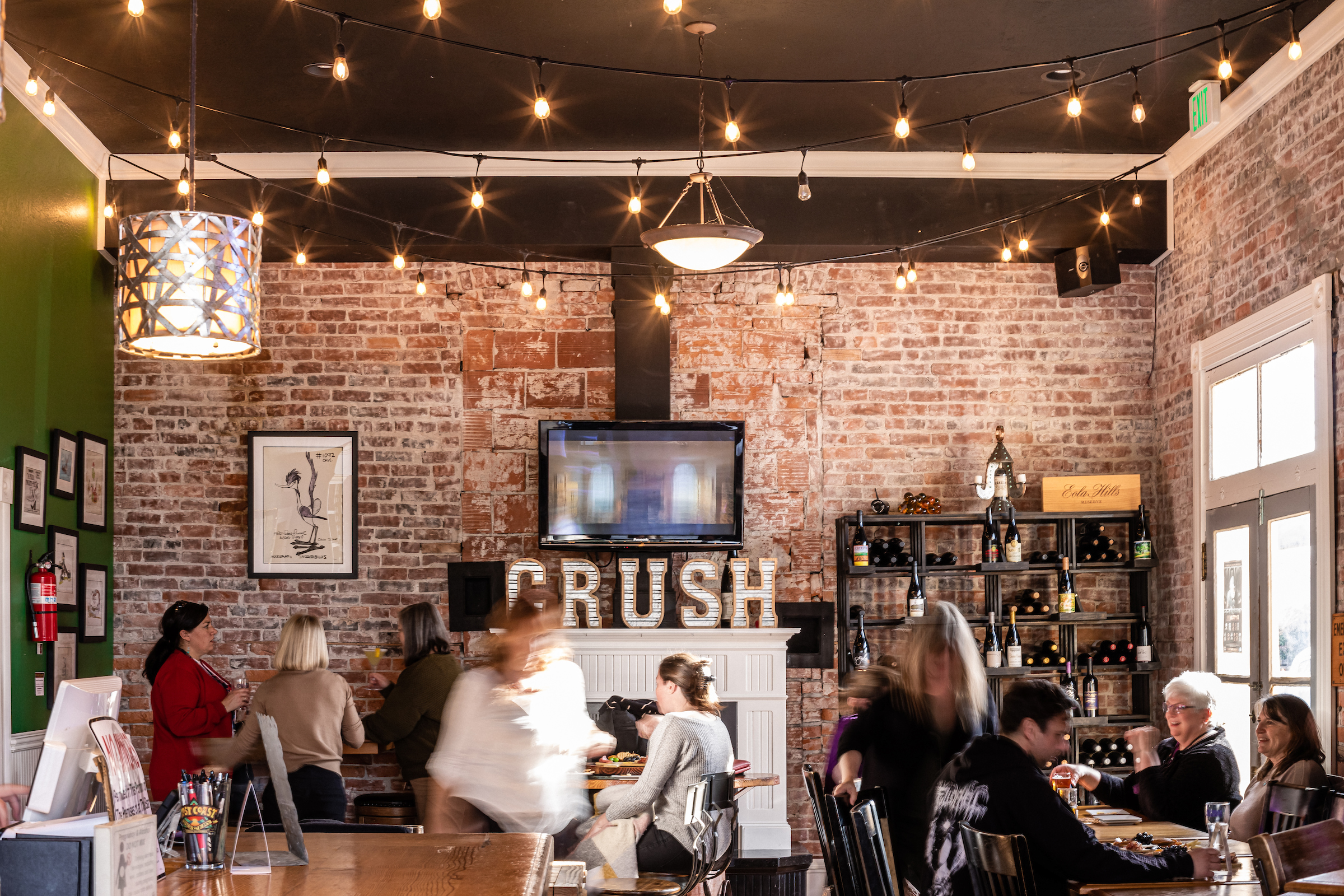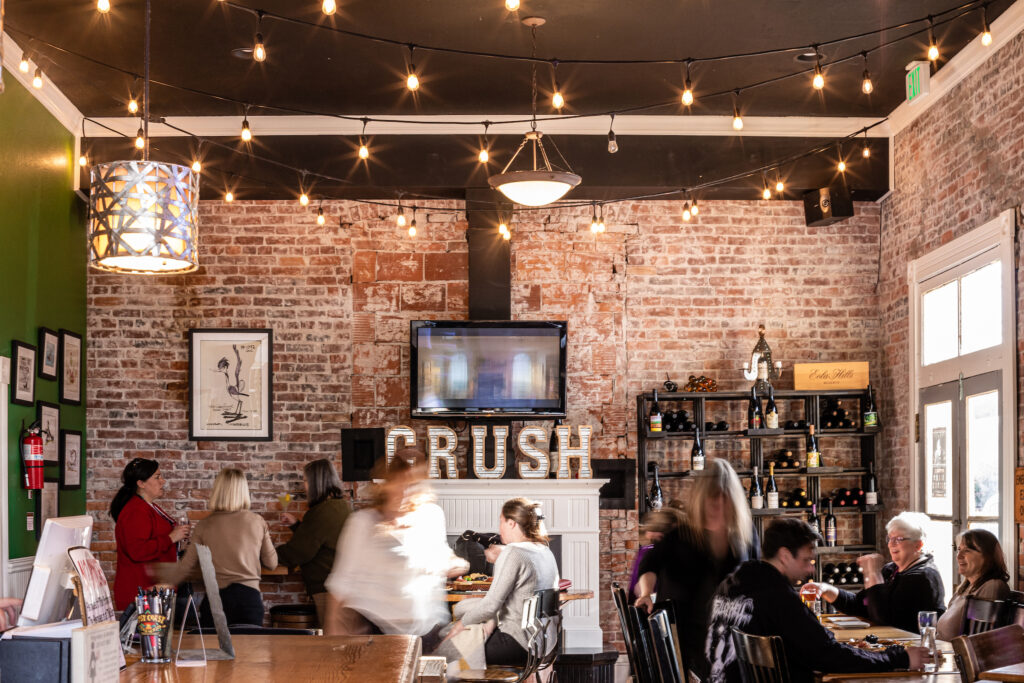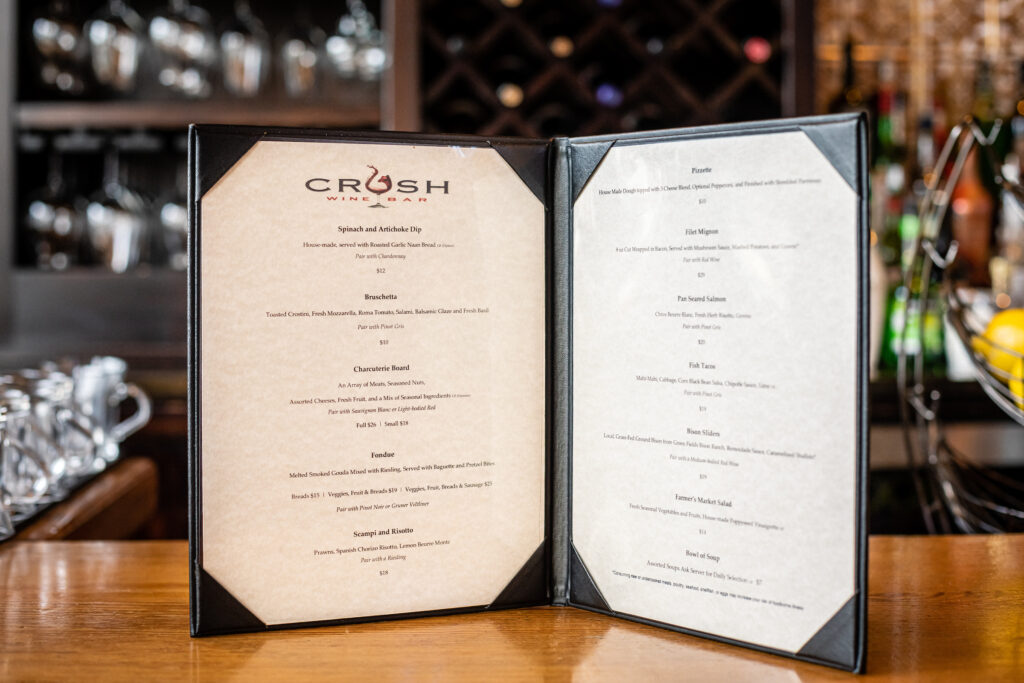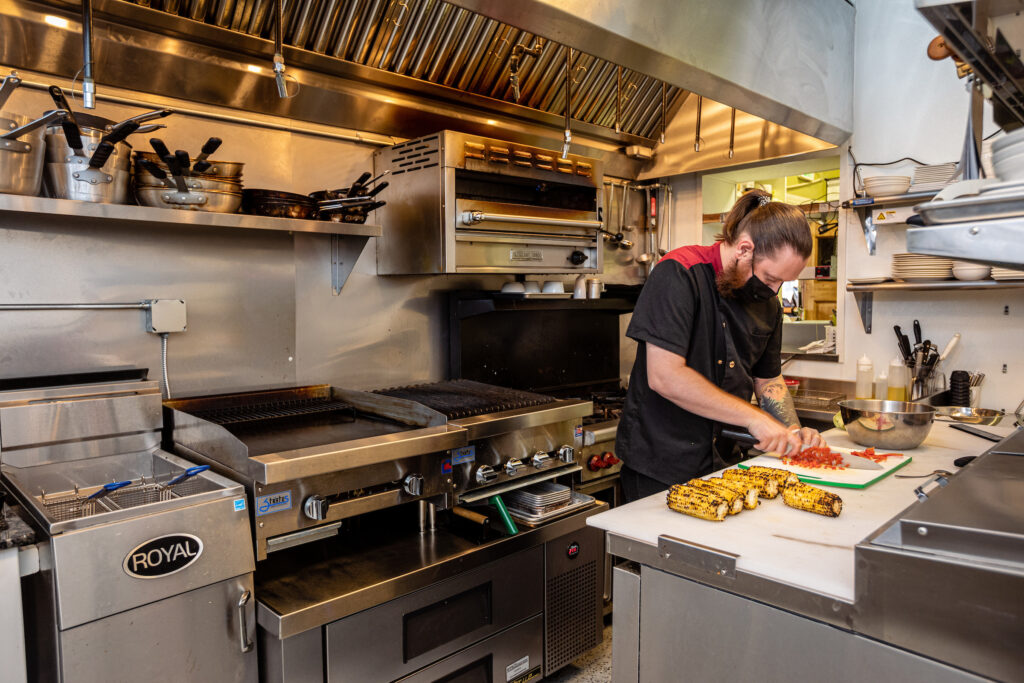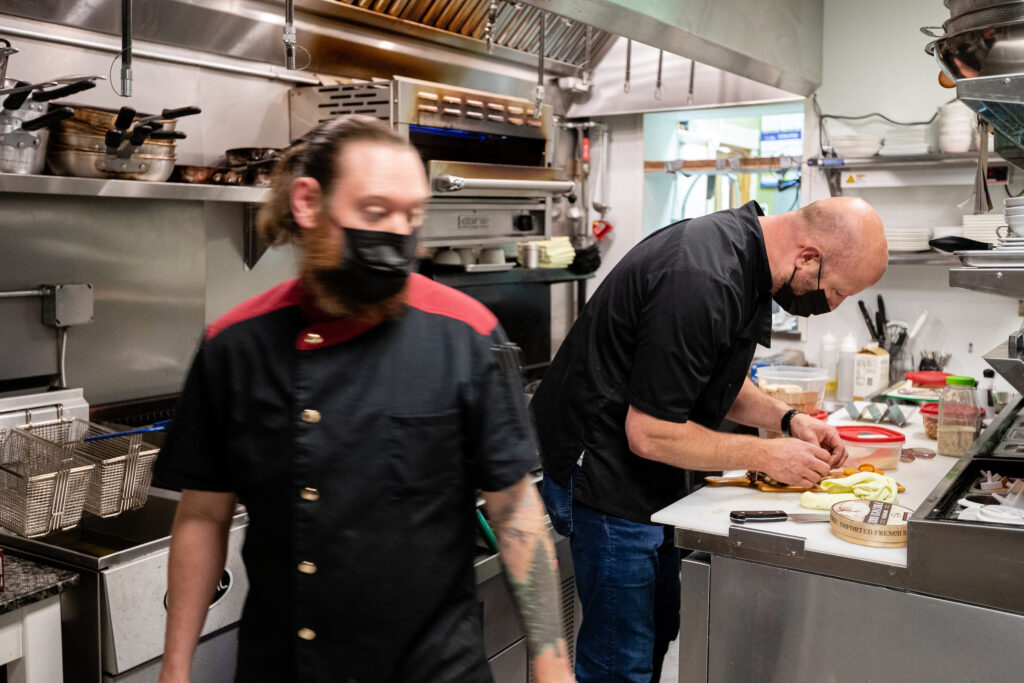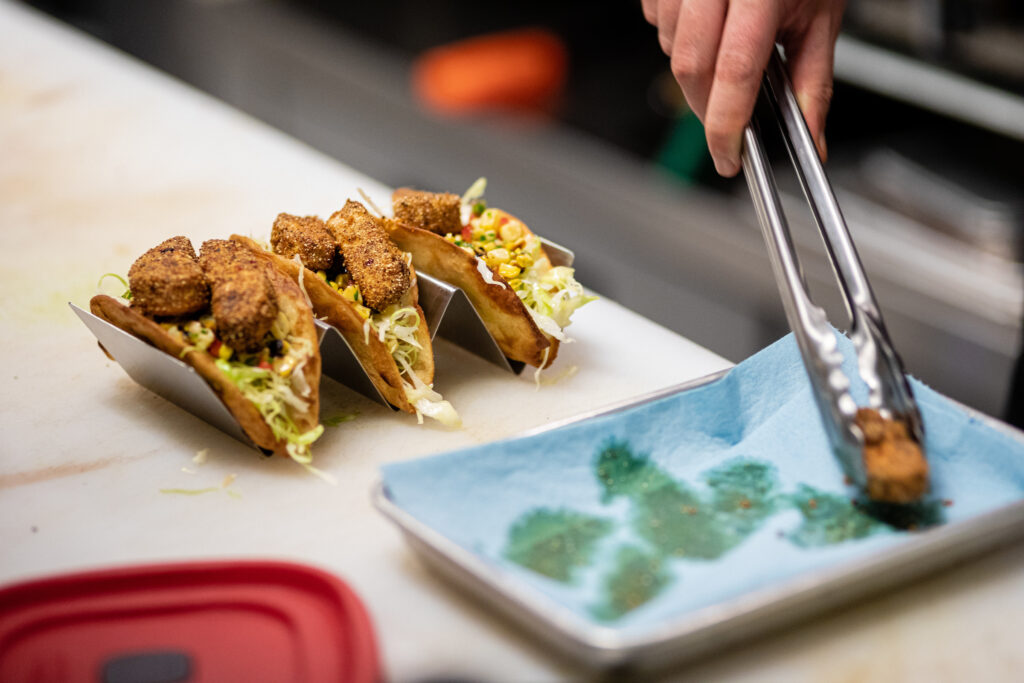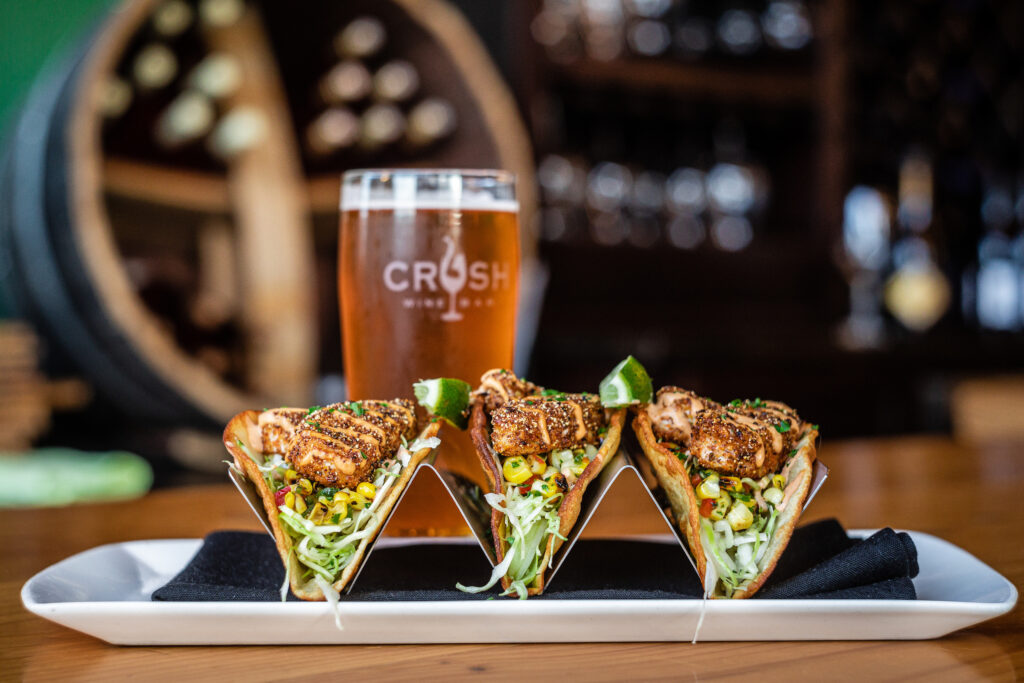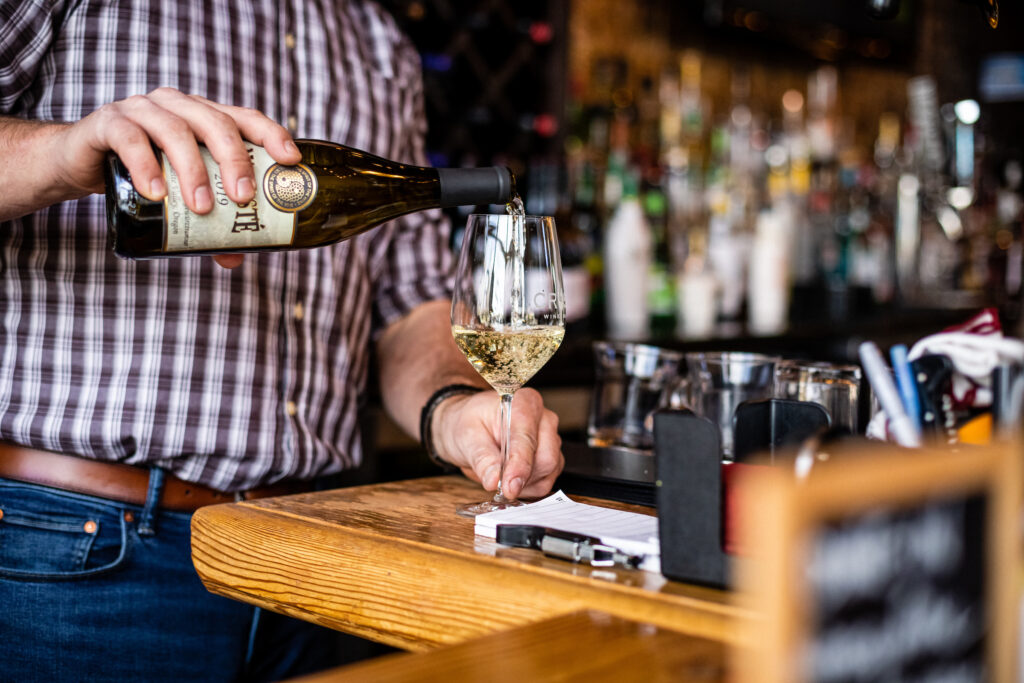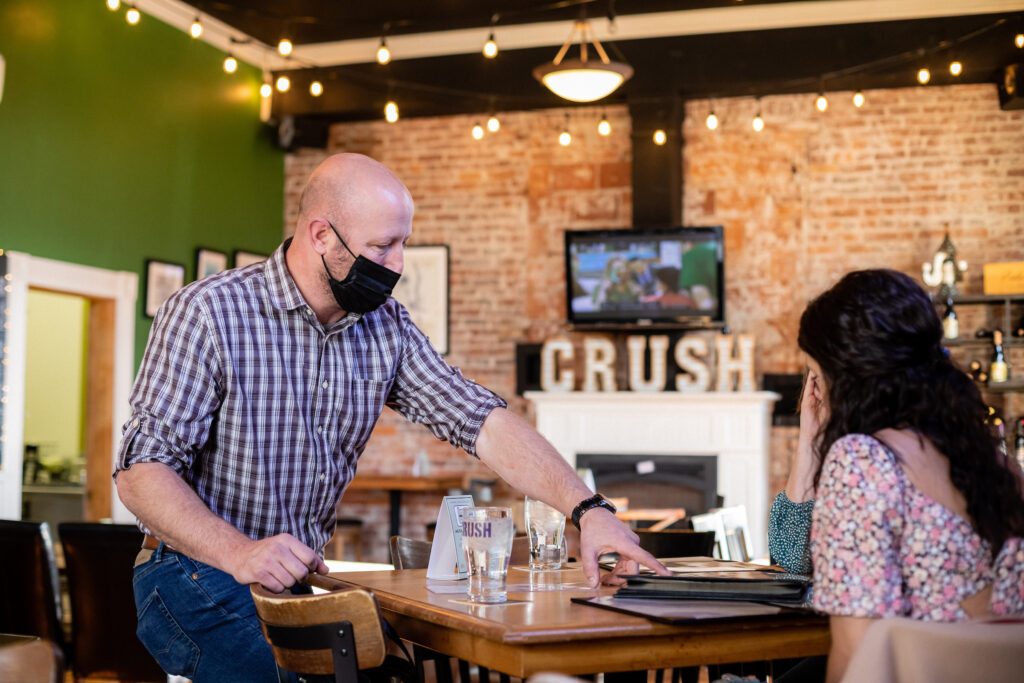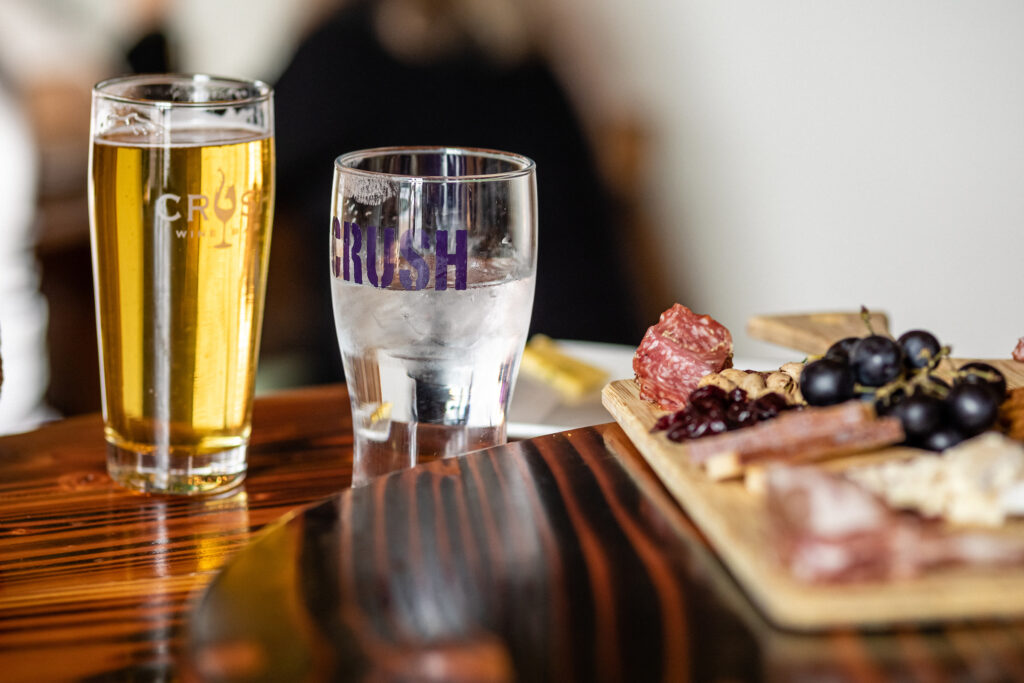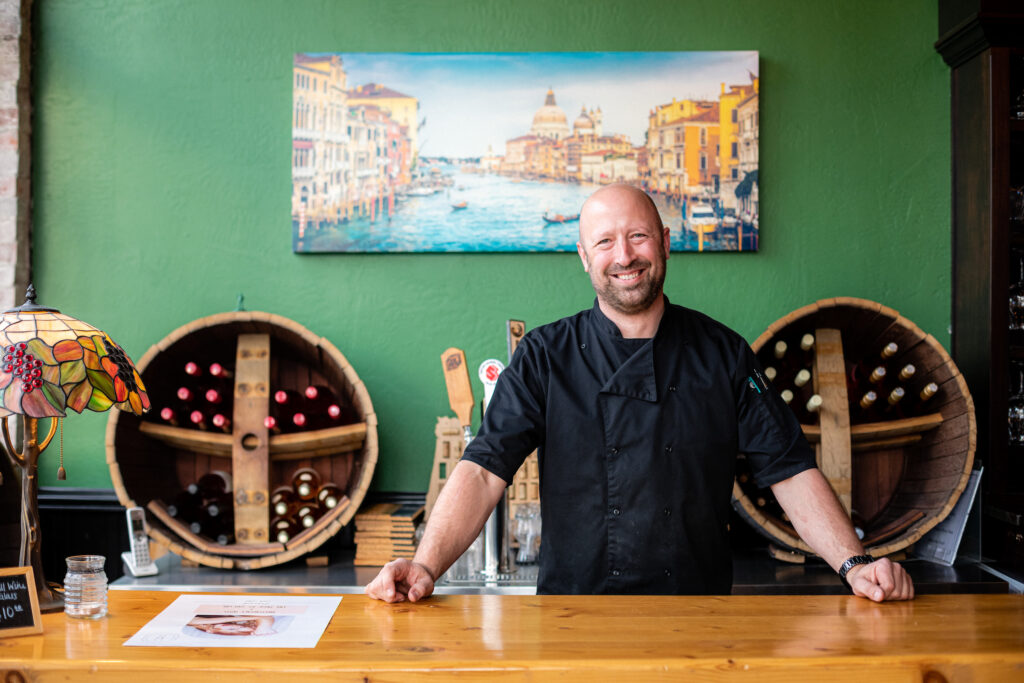John Bracken knows how to pivot. He’s had to adjust his plans on the fly ever since an injury curtailed his football career at Western Oregon University. To make up for the loss of his athletic scholarship, he started waiting tables — learning the ins-and-outs of food service while completing his degree in business and entrepreneurship.
When Bracken took over Crush Wine Bar and Tasting Room in downtown Monmouth in 2019, he hoped to bring new energy to the business, housed in an old brick building across from Main Street Park.
The former owners offered finger foods to pair with the wine list, but Bracken imagined upgrading the existing kitchen (little more than a hot plate) to support a full restaurant menu.
“I started realizing how important food is to driving drink sales,” he said. “We were already one of the nicer places in town, so we decided to get our food to the same level.”
He couldn’t know that COVID-19 would soon throw a wrench in those plans, but Bracken’s entrepreneurial background meant he was able to adapt to whatever fate dished up.
A month before pandemic restaurant shutdowns rolled out, Crush introduced an expanded menu. But health issues soon caused the chef who developed the new menu to quit.
“He had a doctor’s appointment the week before the shutdown. The day after the shutdown, he got the call that he couldn’t work anymore,” Bracken said.
“Every single sauce, every menu item, was made from scratch with no recipes yet. It was all in the chef’s head because it was just a trial thing at this point.”
Undaunted, Bracken had the departing chef train him in the kitchen, learning to make bison sliders, blackened salmon, bacon-wrapped filet mignon and other finicky dishes. “I became a cook, very quick,” he said, laughing at the memory.
Then, about a month into the full dinner service, pandemic safety rules caused Crush to close the dining room. Like many small restaurants, the wine bar turned to takeout and delivery as a way to keep the business alive and avoid laying off its staff, many of whom were students at Western Oregon.
“I had a really good crew,” Bracken said. “Most of them were college students that were going to be teachers. I was lucky to have these smart hard workers. Everybody was fighting for each other and fighting for me, which was awesome.”
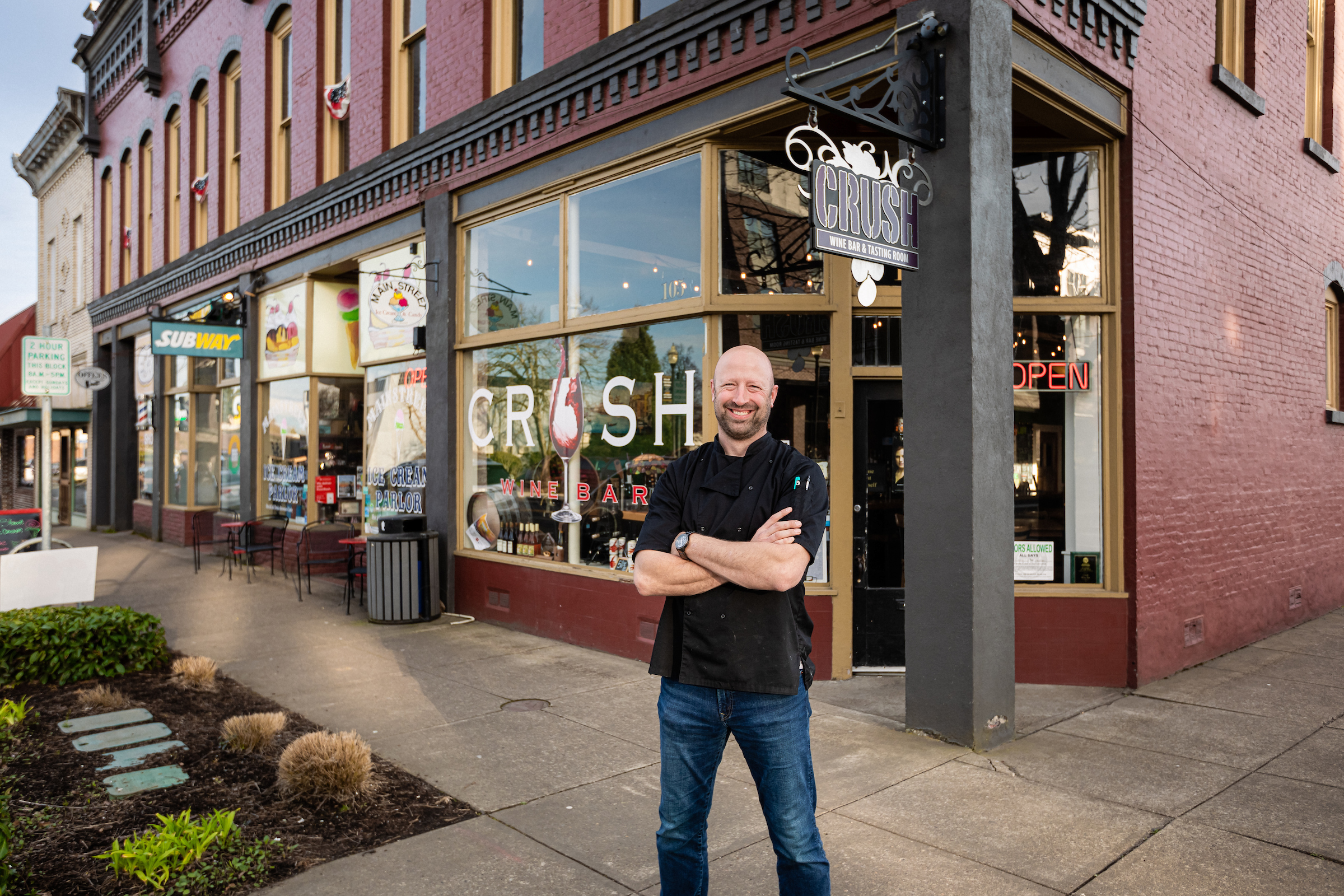
When he bought Crush Wine Bar and Tasting Room in downtown Monmouth, owner John Bracken couldn’t know how much his success would depend on his ability to pivot.
Bracken quickly tapped into his staff’s willingness to experiment. “Within a day and a half, we had my personal vehicle registered to the company so we could do growler and wine bottle deliveries as well as food. That was at least half of our sales, being the only place in town that would deliver wine or beer.”
He also made sure everyone was cross-trained — bartenders learned to be sous chefs; waitstaff became delivery drivers, and so on — so that no one lost their jobs.
When Mother’s Day rolled around, Crush offered wine and mimosa kits, partnering with other local businesses to package the drinks with floral bouquets and chocolate-dipped strawberries for a memorable at-home celebration.
Bracken stepped up his delivery service to meet demand, with drivers crisscrossing the area from Albany to Woodburn to drop off orders. “We had to turn the dining room into an assembly line with tables and flowers and everything else,” he said. “It was craziness, but the team adapted.”
As the months passed and COVID restrictions eased, Bracken was finally able to start his kitchen renovation. He chose gas appliances because they offered a wider selection and better cooking technology than electric.
Another selling point: The energy-efficient deep fryer he bought qualified for cash incentives of $1,000 through Energy Trust of Oregon. And it will cut Crush’s utility bills by more than $400 a year, savings that mean a lot in a business where margins are slim.
“It’s been a little shot in the arm as we’re going through these waves of growing pains,” Bracken said of the incentive. “It was nice to be able to take advantage of that, especially at a time that was so tight fiscally.”
With the new equipment, Bracken’s business is in the midst of another pivot. The kitchen can now prepare twice as many meals as before, and get them to guests quicker, improving Crush’s customer service. And Bracken has become more inventive with the menu, offering weekly and seasonal specials to keep his regulars coming back.
“It’s allowing us to explore things that we didn’t have the capacity for previously,” he said. “That’s a big deal.”
Learn more about energy efficiency for your restaurant or food service business with Energy Trust.
John Bracken sabe cómo maniobrar. De repente tuvo que ajustar sus planes cuando una lesión interrumpió su carrera de fútbol americano en Western Oregon University. Para compensar la pérdida de su beca deportiva, empezó a trabajar como mesero. Aprendió los pormenores del servicio de comidas mientras completaba su licenciatura en negocios y emprendimiento.
Cuando Bracken se hizo cargo de Crush Wine Bar and Tasting Room en el centro de Monmouth en 2019, ubicado en un antiguo edificio de ladrillo frente al parque de Main Street, esperaba traer nueva energía al negocio.
Los antiguos propietarios ofrecían aperitivos para acompañar la lista de vinos, pero Bracken imaginó mejorar la cocina existente (que prácticamente constaba de una pequeña estufa portátil) para apoyar un menú de restaurante completo.
“Empecé a darme cuenta de lo importante que es la comida para impulsar las ventas de bebidas”, dijo Bracken. “Ya éramos uno de los lugares más agradables de la ciudad, así que decidimos poner nuestra comida al mismo nivel”.
Él no tenía forma de saber que el COVID-19 pronto interrumpiría esos planes, pero la experiencia empresarial de Bracken le permitió adaptarse a lo que el destino le deparara.
Un mes antes de que se produjera el cierre pandémico de los restaurantes, Crush introdujo un menú ampliado. Pero los problemas de salud pronto hicieron que el chef que desarrolló el nuevo menú renunciara.
“Tuvo una cita con el médico la semana anterior al cierre. Al día siguiente del cierre, le llamaron para decirle que no podía seguir trabajando”, cuenta Bracken.
“Cada una de las salsas y cada elemento del menú se hicieron desde cero, sin recetas todavía. Todo estaba en la cabeza del chef porque en ese momento era solo una cosa de prueba”.
Sin desanimarse, Bracken hizo que el chef saliente lo entrenara en la cocina, aprendiendo a hacer sliders de bisonte, salmón ennegrecido, filet mignon envuelto en tocino y otros platos delicados. “Rápidamente me convertí en un cocinero”, dijo Bracken, riendo al recordarlo.
Al cabo de un mes de servicio de cena completo, las normas de seguridad de la pandemia obligaron a Crush a cerrar el comedor. Al igual que muchos restaurantes pequeños, el bar de vinos recurrió a la comida para llevar y al reparto a domicilio como forma de mantener vivo el negocio y evitar el despido de su personal, muchos de los cuales eran estudiantes de Western Oregon.
“Tenía un equipo muy bueno”, dijo Bracken. “La mayoría eran estudiantes universitarios que iban a ser profesores. Tuve la suerte de contar con estos trabajadores inteligentes. Luchaban unos por otros y luchaban por mí, lo cual era increíble”.

Cuando John Bracken compró Crush Wine Bar and Tasting Room en el centro de Monmouth, no se imaginaba hasta qué punto su éxito dependería de su capacidad de maniobrar.
Bracken no tardó en aprovechar las ganas de experimentar que tenían sus empleados. “En un día y medio, teníamos mi vehículo personal registrado en la empresa para poder hacer entregas de growlers y botellas de vino, así como de comida. Eso suponía al menos la mitad de nuestras ventas, al ser el único lugar de la ciudad que entregaba vino o cerveza”.
Cuando llegó el Día de la Madre, Crush ofreció kits de vino y mimosas, asociándose con otros negocios locales para empaquetar las bebidas con ramos de flores y fresas bañadas en chocolate para una celebración memorable en casa.
Bracken intensificó su servicio de entrega para satisfacer la demanda, con conductores que recorrían la zona desde Albany hasta Woodburn para dejar los pedidos. “Tuvimos que convertir el comedor en una cadena de montaje con mesas, flores y todo lo demás”, dijo Bracken. “Fue una locura, pero el equipo se adaptó”.
Con el paso de los meses y la disminución de las restricciones del COVID, Bracken pudo por fin iniciar la renovación de su cocina. Eligió los electrodomésticos de gas porque ofrecían una selección más amplia y una mejor tecnología de cocina que los eléctricos.
Otro factor de venta: La freidora de alta eficiencia energética que compró calificaba para incentivos de $1,000 en efectivo a través de Energy Trust of Oregon. Y reducirá las facturas de los servicios públicos de Crush en más de $400 al año, un ahorro que significa mucho en un negocio en el que los márgenes son escasos.
“Ha sido como una pequeña inyección en el brazo mientras atravesamos estas oleadas de dolores de crecimiento”, dijo Bracken sobre el incentivo. “Fue agradable poder aprovecharlo, especialmente en un momento tan ajustado fiscalmente”.
Con el nuevo equipo, el negocio de Bracken se encuentra en medio de otra maniobra. Ahora la cocina puede preparar el doble de comidas que antes y hacerlas llegar a los clientes más rápidamente, mejorando el servicio al cliente de Crush. Y Bracken se ha vuelto más inventivo con el menú, ofreciendo especiales semanales y de temporada para que sus clientes habituales siempre vuelvan.
“Nos está permitiendo explorar cosas para las que antes no teníamos capacidad”, dijo Bracken. “Eso es algo importante”.
Obtenga más información sobre la eficiencia energética para su restaurante o negocio de comida con Energy Trust.


